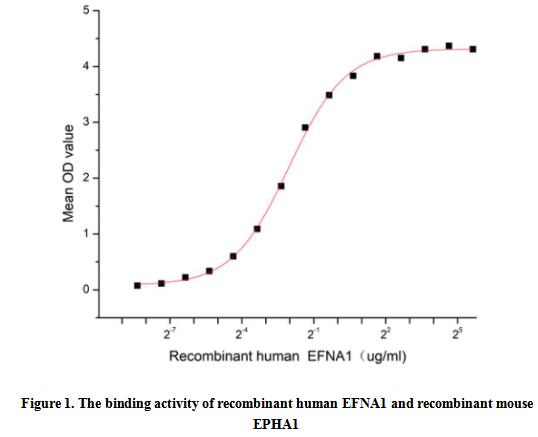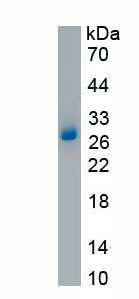Active Ephrin A1 (EFNA1)
B61; ECKLG; EFL1; EPLG1; LERK1; TNFAIP4; EPH-related receptor tyrosine kinase ligand 1; Tumor necrosis factor alpha-induced protein 4; Immediate early response protein B61
- Product No.APE107Hu01
- Organism SpeciesHomo sapiens (Human) Same name, Different species.
- Buffer FormulationPBS, pH7.4, containing 0.01% SKL, 5% Trehalose.
- Traits Freeze-dried powder
- Purity> 95%
- Isoelectric Point6.4
- ApplicationsCell culture; Activity Assays.
- DownloadInstruction Manual
- UOM 10µg50µg 200µg 1mg 5mg
- FOB
US$ 194
US$ 486
US$ 972
US$ 2916
US$ 7290
For more details, please contact local distributors!
ACTIVITY TEST

Ephrin-A1 (EFNA1), also known as EPLG1, LERK1, TNFAIP4, Immediate early response protein B61, is a member of the A-type ephrin family of cell surface proteins that function as ligands for the A-type Eph receptor tyrosine kinase family. EFNA1 plays an important role in angiogenesis and tumor neovascularization. EFNA1 widely affects tumor growth through enhancing tumor angiogenesis, malignant cell events and invasiveness. Ephrin Type A Receptor 1 (EPHA1) is one of high-affinity ligands for EFNA1, thus a functional binding ELISA assay was conducted to detect the interaction of recombinant human EFNA1 and recombinant mouse EPHA1. Briefly, biotin-linked EFNA1 were diluted serially in PBS, with 0.01% BSA (pH 7.4). Duplicate samples of 100 ul were then transferred to EPHA1-coated microtiter wells and incubated for 1h at 37℃. Wells were washed with PBST 3 times and incubation with Streptavidin-HRP for 30min, then wells were aspirated and washed 5 times. With the addition of substrate solution, wells were incubated 15-25 minutes at 37℃. Finally, add 50 µl stop solution to the wells and read at 450 nm immediately. The binding activity of recombinant human EFNA1 and recombinant mouse EPHA1 was shown in Figure 1, the EC50 for this effect is 0.24 ug/mL.
USAGE
Reconstitute in 10mM PBS (pH7.4) to a concentration of 0.1-1.0 mg/mL. Do not vortex.
STORAGE
Avoid repeated freeze/thaw cycles. Store at 2-8°C for one month. Aliquot and store at -80°C for 12 months.
STABILITY
The thermal stability is described by the loss rate. The loss rate was determined by accelerated thermal degradation test, that is, incubate the protein at 37°C for 48h, and no obvious degradation and precipitation were observed. The loss rate is less than 5% within the expiration date under appropriate storage condition.
GIVEAWAYS
INCREMENT SERVICES
-
 BCA Protein Quantification Kit
BCA Protein Quantification Kit
-
 Molecular Mass Marker for Protein
Molecular Mass Marker for Protein
-
 Monoclonal Antibody Customized Service
Monoclonal Antibody Customized Service
-
 Polyclonal Antibody Customized Service
Polyclonal Antibody Customized Service
-
 Protein Activity Test Experiment Service
Protein Activity Test Experiment Service
-
 Electrophoretic Mobility Shift Assay (EMSA) Experiment Service
Electrophoretic Mobility Shift Assay (EMSA) Experiment Service
-
 Buffer
Buffer
-
 Lentivirus Packaging Experiment Service
Lentivirus Packaging Experiment Service
-
 Adenovirus Packaging Experiment Service
Adenovirus Packaging Experiment Service
-
 Real Time PCR Experimental Service
Real Time PCR Experimental Service
-
 Spike RBD Protein (S-RBD)
Spike RBD Protein (S-RBD)
-
 Protein G
Protein G
-
 Protein A
Protein A
| Catalog No. | Related products for research use of Homo sapiens (Human) Organism species | Applications (RESEARCH USE ONLY!) |
| APE107Hu01 | Active Ephrin A1 (EFNA1) | Cell culture; Activity Assays. |
| RPE107Hu01 | Recombinant Ephrin A1 (EFNA1) | Positive Control; Immunogen; SDS-PAGE; WB. |
| PAE107Hu01 | Polyclonal Antibody to Ephrin A1 (EFNA1) | WB; IHC; ICC; IP. |
| MAE107Hu21 | Monoclonal Antibody to Ephrin A1 (EFNA1) | WB; IHC; ICC; IP. |
| SEE107Hu | ELISA Kit for Ephrin A1 (EFNA1) | Enzyme-linked immunosorbent assay for Antigen Detection. |
| LME107Hu | Multiplex Assay Kit for Ephrin A1 (EFNA1) ,etc. by FLIA (Flow Luminescence Immunoassay) | FLIA Kit for Antigen Detection. |







